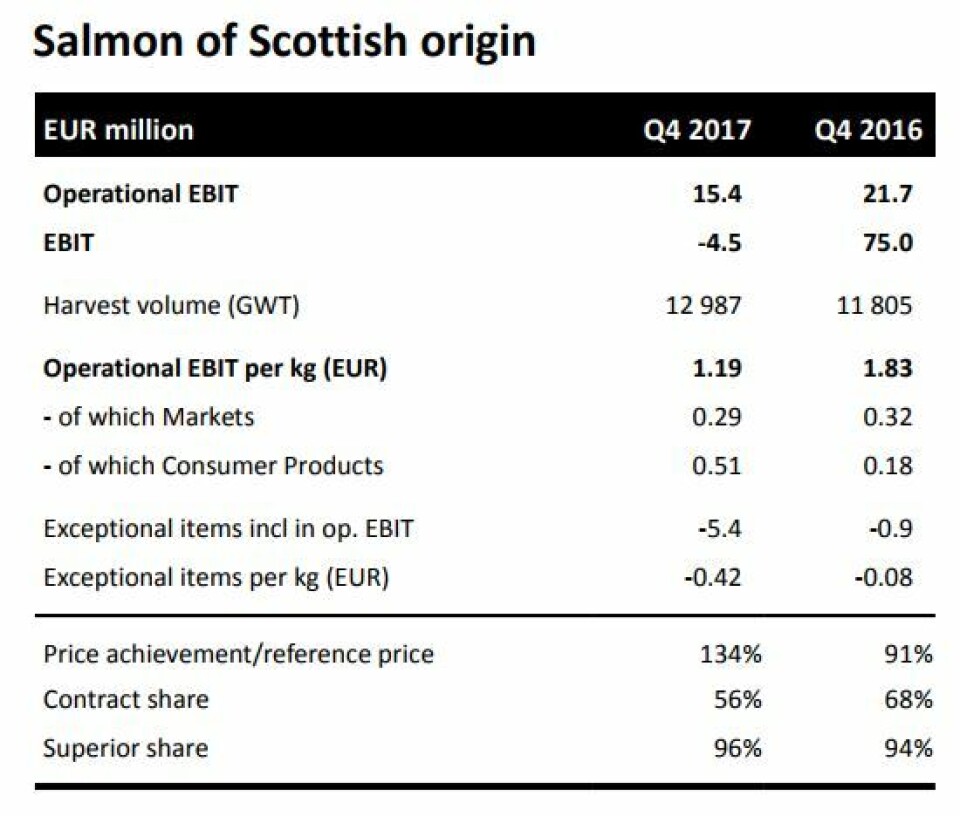
Marine Harvest makes €792m, reveals €50m cuts
Marine Harvest has announced record operating profits €792 million for 2017, but has also warned that it must make huge savings this year.
Chief executive Alf-Helge Aarskog is concerned about increasing costs and challenging biological conditions, and said the company has implemented a global cost cutting programme to save €50 million.
Globally, Marine Harvest achieved an operating operating profit of €181m in the fourth quarter of last year.

"Global output growth in the industry put pressure on salmon prices in all markets in the fourth quarter. It is encouraging that production and supply increase, but the market needs time to adapt to the growth after the global production decline we saw in 2016," said Aarskog in a stock market announcement.
Global cost-cutting programme
"2017 was a very good year for Marine Harvest financially, and I'm proud of the effort all Marine Harvest employees have put in place to achieve this. However, I am concerned about increasing costs and challenging biological conditions. We have therefore implemented a global cost cutting programme, aiming to save €50 million. We expect to make savings in all parts of the organisation," added the CEO.
MH Scotland's Q4 operating profit was €15.4m (€21.7m in Q4 2016), the equivalent of €1.19 per kg (€1.83 in Q4 2016).
The company said the effects of increased margin allocated from consumer products to salmon of Scottish origin and increased harvest volume were more than offset by cost increases due to harvest from lower performing sites and mortality. Financial EBIT, which takes into account profit after expenses except interest and tax, amounted to €-4.5m (€75m). For the whole of 2017, MH Scotland made an operating profit of €153.7m.
Targeted harvest
MH Scotland's fourth-quarter harvest volume was 12,987 tonnes gutted weight, up from 11,805 tonnes in Q4 2016, due to targeted harvest to mitigate biological challenges.
The cost level per kg harvested increased in Q4 2017 compared to Q4 2016, due to lower performing sites and increased mortality. Biological costs per kg increased by 14% compared to the corresponding quarter of 2016, mainly due to increased health costs.
Incident-based mortality of €5.4m (€0.9m Q4 2016) was recognised mainly due to anaemia, bacterial infection and cardiomyopathy syndrome (CMS).
Sea lice levels at the end of the quarter were lower than at the end of the comparable quarter of 2016.
Challenging fourth quarter
In its Q4 report, Marine Harvest sates: "While the general fish health situation improved for our Scottish operations during the three first quarters of 2017, the biological performance has been more challenging in the fourth quarter. This situation is not expected to improve significantly in the next quarter. Combined with low volumes costs are expected to remain at the current high level also in the first quarter of 2018."
MH Scotland managing director Ben Hadfield said: “Despite a challenging year for fish health we produced record results in Scotland. My thanks go to our hard working employees across the West Coast and Highlands and Islands.”
A big plus point for MH Scotland has been the quality and size of the salmon grown by the company. More than 96% of the salmon produced has been rated as superior quality, which attracts higher prices.
Marine Harvest Norway achieved an operating operating profit per kg of €1.77 (€2.70) in the fourth quarter, while Marine Harvest Canada achieved operating operating earnings per kg of €0.98 (€3.33).
Marine Harvest Chile achieved an operating operating profit per kg of €1.03 in the quarter (€2.61). These figures include contributions from sales and marketing, including consumer products.






















































